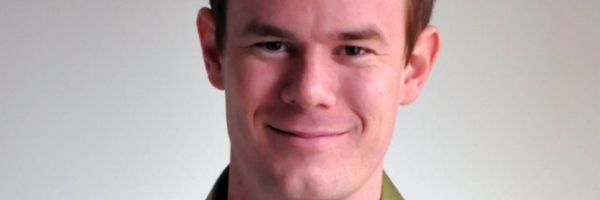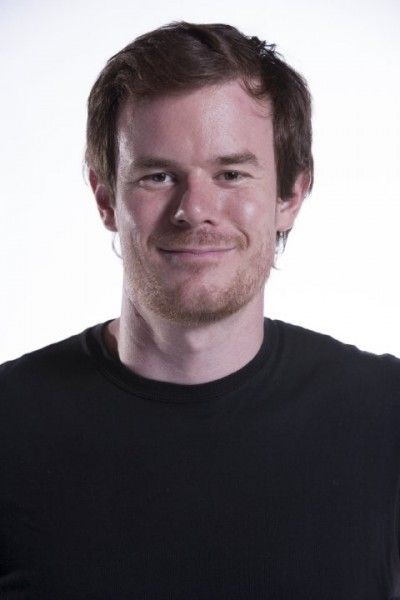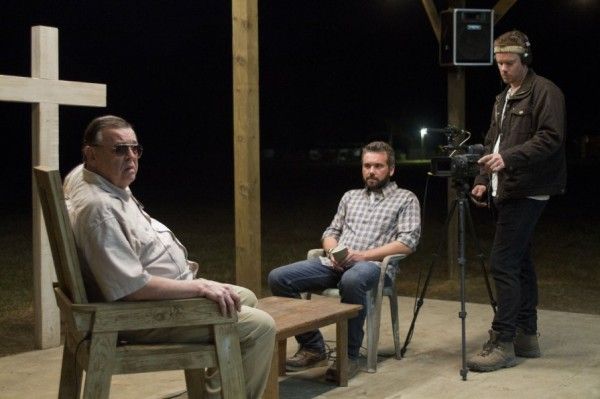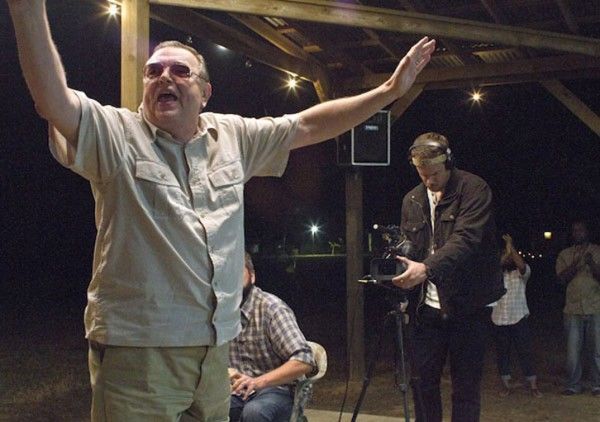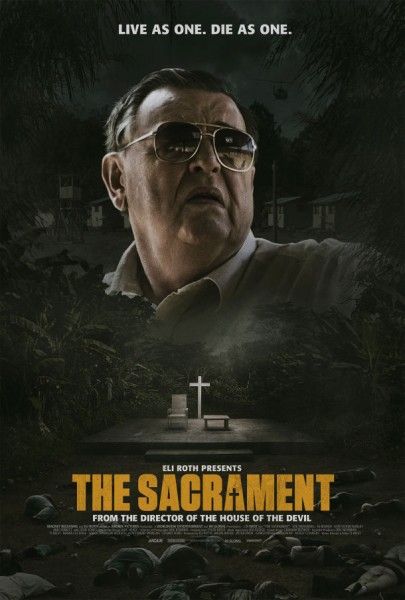Available now on VOD and in select theaters is The Sacrament, Ti West's horrific look at the final hours of the Jonestown inspired cult, Eden Parish, as told through the lens of a VICE documentary. In the role of Jake, cameraman to the documentary crew, Joe Swanberg tackles the unique challenge of creating a character that exists largely off-screen while also lending his cinematographic talents as camera operator for some of the film. Known mostly as a prolific filmmaker at the forefront of the "mumblecore" movement, Swanberg has been making a name for himself as an actor in his both own films and those of his peers, and with The Sacrament he adds another solid performance to his resume. The Sacrament also stars A.J. Bowen, Gene Jones, Amy Seimetz, and Kentucker Audley.
At a recent LA press day I sat down for an exclusive interview with Swanberg. He talked about working with director and frequent collaborator Ti West, the perks of working with a cast full of directors, the challenges of performing in a vérité film, whether or not he'd like to make a studio film, how his career has evolved, and more. Check out what he had to say after the jump.
Collider: Most of the people involved in this film know each other and have worked together before, and you've known Ti for a while.
JOE SWANBERG: Yeah.
At what point was this film brought up to do you and how quickly did it come together for you?
SWANBERG: Yeah, I talk to Ti a lot so I was sort of aware of it while he was starting to think about it and...I don’t know, there was a sort of a couple of months of a period where it was an idea that he was excited about and kind of kicking around. I was already interested in Jonestown anyway, so I don’t know when he asked me to be in it, but you know I feel like I was part of its evolution and I kind of was up to date on it as it was growing into and becoming the movie it became.
I'm also curious because so many of you don’t just know each other, but you're also filmmakers, what was like on set? Specifically for you, because you were actually playing the camera man. So what kind of collaboration went on there? How often were you actually wielding the camera?
SWANBERG: Yeah, I shot a good bit of it. Ti and I kind of traded off. A lot of it I had to shoot because the camera turns around and he wanted to be able to play those takes as live takes all the way through the scene. You know, it's not my movie so there's an aspect of just turning off my director personality, and being a little more submissive and just trying to be helpful, help somebody else tell their story.
Is that tough for you to turn off?
SWANBERG: Not usually, you know I also cast a lot of directors to act in my movies and I think that I'm so appreciative to have their input around when I want it, but I also- I've had good examples of directors being able to turn it off, so by the time that I started acting in other peoples movies I kind of knew that I had to be on my best behavior. But I think it's nice. It's nice to have a lot of directors around, because directors are natural problem solvers so I think that everybody is looking for an elegant solution to a problem. Its sort of a different energy than an actor brings where they're committed to a character. I think directors keep a lot of practical concerns in their head too, so you try and own that character and you try and be devoted to that character, but when the light is going down and there's sound issues, as a director you know what's happening, so you kind of know that you're only going to get two more takes out of it. I don’t know, there's just a more practical approach to it that I think, especially on the indie level, is sometimes really useful.
I'm also curious because this was shot in the documentary style, did that make it an extra challenge for you as an actor in any way?
SWANBERG: Yeah, it's a different kind of thing for sure. The fact that there's not going to be coverage really changes how the film is going to be edited. You don't have a lot of the built-in takes and you don't have as many chances to try variations on it, and also your performance style then is rooted entirely in realism. Your whole job as an actor then is to be believably real as opposed to trying to be funny or dramatic, or you know what I mean? There are different challenges that present themselves when you're doing more of a straightforward movie. Then there's just the technical aspects of it, like being a camera operator and trying to act is a vary different thing than just acting. And what was even harder, sort of the most difficult challenge, was when Ti was operating the camera, but I had dialogue with the other actors, because then I had nothing to do physically and I also wasn't involved in the scene in a traditional way. I was just sort of hanging behind Ti's shoulder trying to get a line in or interact, which felt really disconnected from how the camera was moving and how people were reacting to me. So it ended up being more of a technical acting experience than I thought it was going to be going into it.
That's funny, I was just talking to Amy about how she looks at the camera a lot in the movie and how that was difficult. It's like the complete opposite challenge.
SWANBERG: Yeah, totally. Both are really hard and they're things you've trained yourself to not to so it's hard. It really feels unnatural to look at a lens or on the flipside of that to be the camera, but also not. Because when somebody's holding a camera, the lens is here, but their eyes are here so you want to make eye contact, but Amy's job was to look at the lens not me. So yeah, it's very weird. The whole thing's weird.
When you started doing filmmaking did you anticipate you would be doing as much acting as you've ended up doing?
SWANBERG: Not at all, no. I never was very interested in acting when I was in film school, and the times that I did it I thought it was really bad at it. I started up again just in my own films because I was playing myself, basically. I still don't know that I can really act.
I think you're a really good actor to be honest.
SWANBERG: Well, thanks, that's nice, but I feel confident that I can be myself on camera, I'm not so confident that I can play a character and inhabit somebody totally different than me, you know what I mean?
Sure, but you're good at the honesty of the moment, which is kind of the most important part.
SWANBERG: Yeah, well that part of it is what's exiting to me too. I like that aspect about acting when you really can connect with somebody in the scene and there is a true back and forth, even if it's scripted. But no, it's been a complete surprise, a happy surprise. I like to do it so it's fun when people ask me, but no I didn’t have any kind of idea that I would be doing so much of it.
The whole sort of digital revolution that has allowed this kind of filmmaking to rise has been really fascinating, and you've been sort of at the forefront of that for the last ten years or so. Now your career is at this really interesting stage where you're making films that are being a little bit more accepted by the mainstream, but you you're also still thriving in this medium. Can you talk a little bit about what these last couple years have been like for you?
SWANBERG: Sure, yeah, I mean I've been basically fortunate recently to be still making movies in exactly the same way I always was, but there's bigger film festivals are showing the movies, and some recognizable actors have been drawn to want to work in this way, so it's been a really interesting and exciting couple of years because it’s felt so natural. Doing something like Drinking Buddies was really cool because we were shooting it in Chicago, I was just making an improvised movie that I wrote, but suddenly there was a bigger crew there and these great actors, who I was a fan of, were kind of on board to just come and try this thing. So I don’t know, it's a little like I expect the bottom to fall out at any second. It's just kind of like I'm just riding it for as far as it will take me. But I think the industry is just changing a lot, and I think the little movies that we were all making ten years ago, those of us who kind of stuck with it and kept doing it, the mainstream has come to us more than we've come to the mainstream. It's being contextualized and filmmakers like the Duplass Brothers and Lena Dunham and Lynn Shelton paved the way. They made these projects that played in movie theaters and are on HBO. Context is everything I think, so audiences come to Drinking Buddies and rather than it feeling like a totally weird anomaly to them, it sort of fits into something that's a little bit familiar and it feels like something they’ve heard about or read about. Yeah, it's really exciting. I'm just trying to keep telling personal stories that I'm interested in and that I feel like want to be told.
As your name and your brand, so to speak, draw more attention and become more widely known, are you excited at the prospect of possibly doing a big budget studio film or do you exclusively want to continue to make the kind of movies you make?
SWANBERG: Well, I definitely want to continue to make the kind of movies I've been making. Early in my career I said no to a lot of things sort of in a knee-jerk kind of way where I was just so single mindedly focused on what I was doing that I shut everything else out. I think now I'm interested in challenging myself and I'm interested in trying to say yes to things even if they are out of my comfort zone, but I also don't want to just go do a studio movie just because. So it's been a delicate balance of trying to really- when I finish one movie trying to really ask myself what I want to do next and why. So far the answer to that has been to make another personal project of mine, but any day now I might read a script that I really respond to or there might be some movie that I'm excited to do that requires a little bit more money, so I'm open to that right now.
What's coming up for you that you're excited about?
SWANBERG: My movie Happy Christmas with Anna Kendrick is coming out this summer. It will be on VOD June 26th and then it will be in theaters July 25th. Then I just wrapped a new movie called Digging for Fire with Jake Johnson and Rosmarie DeWitt, and I'm editing that now so that will be what I'm working on for the next couple months.

